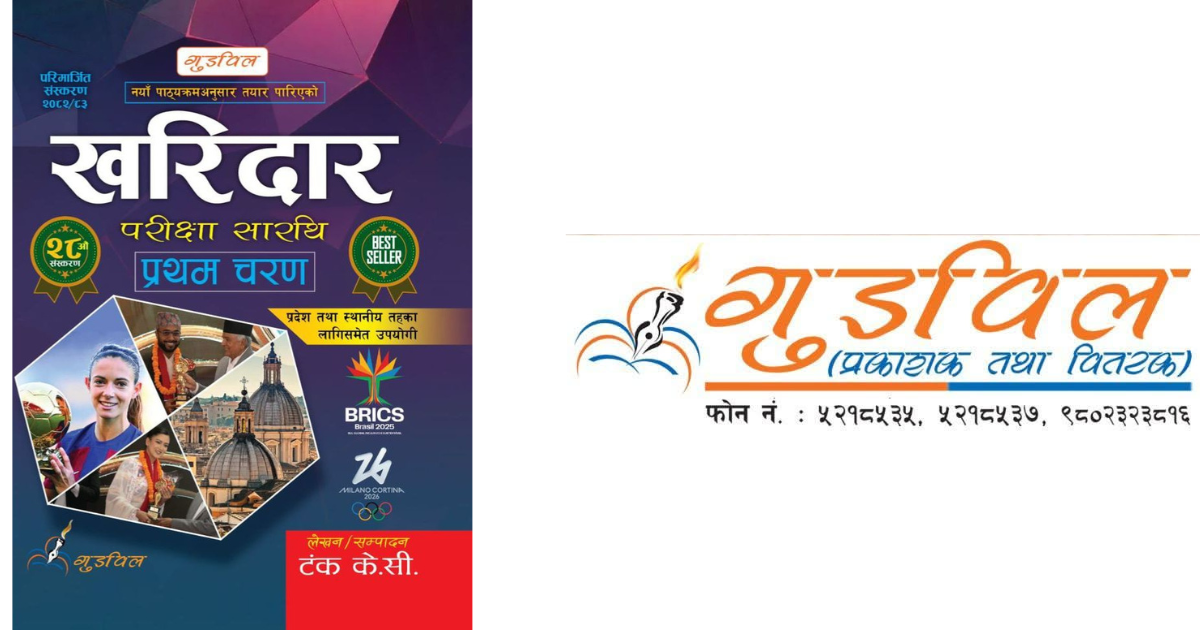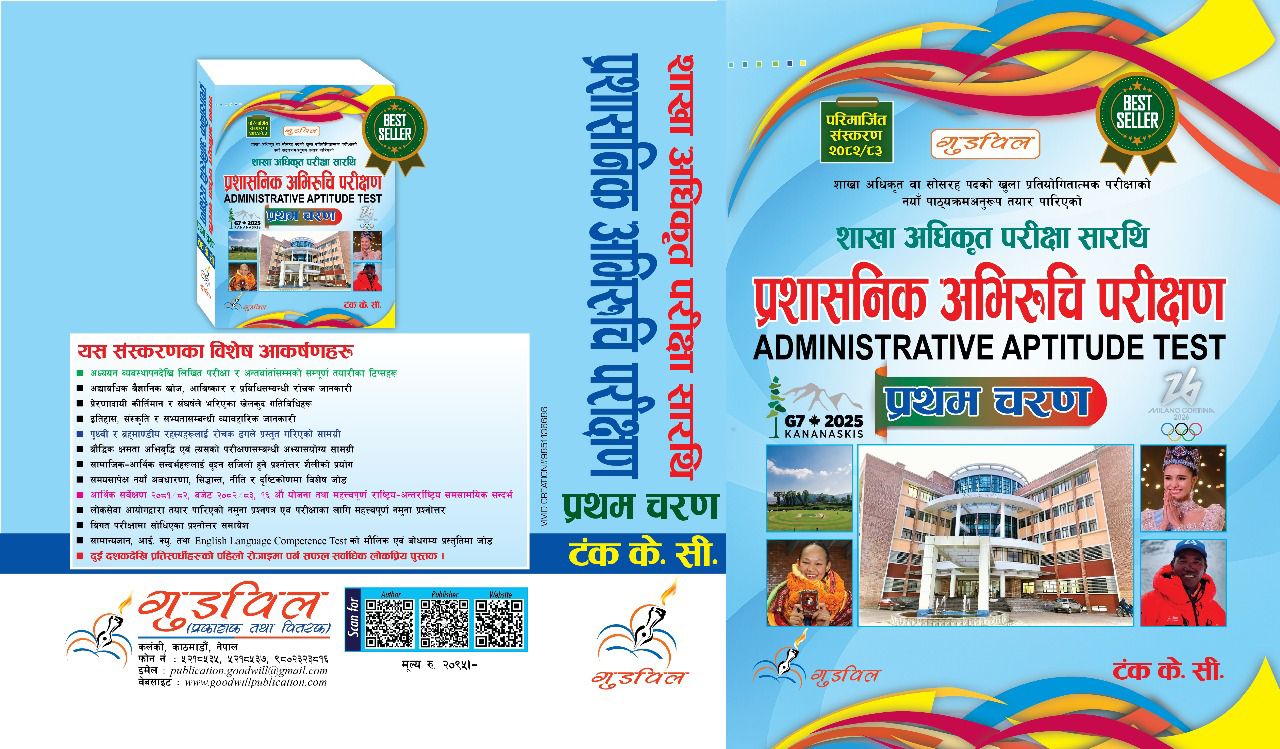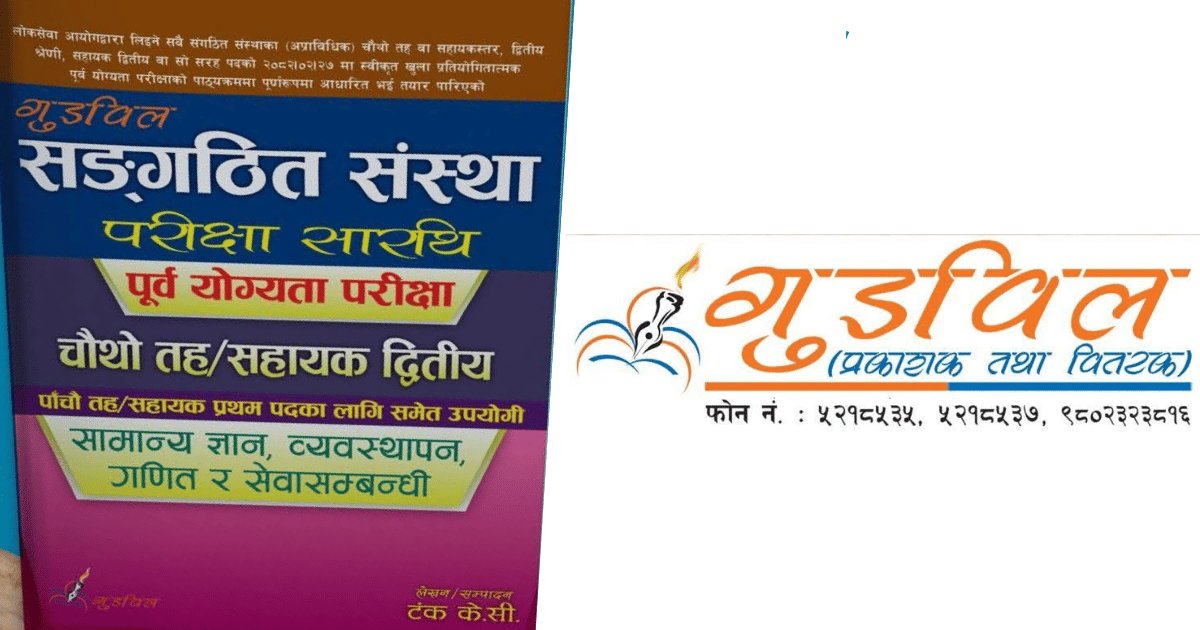
Sangathit Sanstha Pariksha Sarathi
Prepare confidently for Loksewa Level four and Assistant Second Level with Sangathit Sanstha Pariksha Sarathi by Tanka KC. Tailored for Nepal’s top public institutions like Nepal Telecom, Nepal Electricity Authority, Rastriya Banijya Bank,Krishi Bikash Bank, Citizen Investment Trust, Nepal Airlines Corporation,Nepal Beema Sansthan,Gorkhapatra Sansthan, or Nepal Oil Corporation.
Are you
dreaming of a secure government job in Nepal's top public institutions
like Tailored for Nepal’s top public institutions like Nepal Telecom, Nepal Electricity Authority, Rastriya Banijya Bank,Krishi Bikash Bank, Citizen Investment Trust, Nepal Airlines Corporation,Nepal Beema Sansthan,Gorkhapatra Sansthan, or Nepal Oil Corporation?
Then your
journey to success begins with the right preparation – and nothing beats the trusted
and comprehensive guide:
“Sangathit
Sanstha Pariksha Sarathi” by Tanka KC.
Sangathit
Sanstha Pariksha Sarathi isn’t just another guidebook – it’s a complete roadmap for
students and Loksewa aspirants preparing for 4th and 5th Level exams conducted
by various Sangathit Sansthas (Organized Public Institutions) of
Nepal.
Whether you're
just starting your Loksewa journey or appearing again with higher goals, this
book gives you everything you need in one place.
Perfect for Exams
in Public Institutions Like Nepal : Telecom (NTC), Nepal Oil
Corporation (NOC), Nepal Electricity Authority (NEA), Gorkhapatra Sansthan, Nepal Water
Supply Corporation, Rastriya Banijya Bank (RBB), Nepal Bank
Limited (NBL)
Whether you're
aiming for an administrative, technical, or financial post, this book provides
tailored content aligned with the Loksewa syllabus for Sangathit Sanstha
exams.
Why Choose This
Book?
Focused Content
for First Paper (Common Paper)
Written by
Expert Author Tanka KC, trusted in competitive exam circles
Ideal for 4th
and 5th Level Exams
Boosts
Preparation with Real Exam Practice Sets
Suitable for Both New and Repeat
Candidates
What’s Inside?
· Detailed Theory – Simplified
explanations of key concepts, current affairs, and organizational structures
· Objective Practice Questions – Based on
latest syllabus and frequently asked patterns
· Solved Model Sets – Sharpen your
accuracy and timing with exam-style questions
· Focused on First Paper (Paper 1) –
Especially helpful for all competitive exams related to organized government
institutions
· Updated Content – Includes the latest policy updates, amendments, and institutional changes
Who Should Buy
This Book?
· Loksewa Aspirants targeting Sangathit
Sanstha Level 4 & 5 jobs
· Students preparing for the First Paper
of any organized public institution
· Candidates looking for well-structured
theory + practice sets in one book
· Anyone serious about cracking
government job exams in Nepal
Curriculum for
Open Competitive Pre-Qualification Exam for Non-Technical Assistant-Level Posts
in Nepal’s Organized Institutions.
· 1. Geography, Environment and
Population (10 marks)
· 1.1 General knowledge about the
geography of the world (continents, oceans, latitude, longitude, mountain
range, rivers and lakes)
· 1.2 Knowledge about the geography of
Nepal (geographical location, terrestrial features/topography, natural
resources, climate and life)
· 1.3 Knowledge about environment,
biodiversity, sustainable development, climate change, environmental
management, population, urbanization, settlement
· 2. History and Culture (10 marks)
· 2.1 General knowledge about important
historical events of the world
· 2.2 Knowledge about important events,
social and cultural conditions in the history of Nepal (Kiranta period,
Lichchhavi period, Medieval period, Modern history)
· 2.3 Knowledge about Nepal's social
aspects including traditions, norms and values, religions, cultures,
castes/ethnicities, languages, sports, arts and literature
· 3. Economic Aspects and Development (10
marks)
· 3.1 General knowledge about Nepal's
economic indicators (economic growth, gross domestic product, national income,
per capita income, current accounts, balance of payment, remittance, foreign
investment and foreign aid)
· 3.2 General knowledge about the present
status of agriculture, industry, trade, tourism, transportation, communication,
education, health, energy and infrastructure development in Nepal
· 3.3 Planned development in Nepal and
long-term vision, goals, objectives and strategies of the current periodic plan
· 4. Governance and Constitution (10
marks)
· 4.1 Meaning, importance and sources of
laws
· 4.2 Constitutional development of Nepal
· 4.3 The Constitution of Nepal (Parts 1
to 5 and Schedules)
· 4.4 Nepal's governance system and
federal, provincial and local governments
· 4.5 Democracy, human rights, periodic
election and adult franchise
5.
International Affairs and International Institutions/Organizations (10 marks)
5.1 Nepal's
relations with India, China, Britain, America, Russia, France, Japan and other
SAARC countries
5.2 United
Nations: Establishment, Objectives, Organs, Specialized Agencies and Activities
5.3 South Asian
Association for Regional Cooperation (SAARC) : Establishment, Objectives,
Organs and Activities
5.4 Knowledge
about BIMSTEC, ASEAN, European Union, World Bank, International Monetary Fund,
Asian Development Bank, Asian Infrastructure Investment Bank, SAFTA
6. Science
Technology, Public Health and Current Affairs (10 marks)
6.1 Knowledge
about scientific measurement, measurement systems and units
6.2 Major
scientific inventions and latest activities that have a direct impact on human
life and society
6.3 General
knowledge about computer and its applications, and Knowledge and communication
technology
6.4 Knowledge
about public health, diseases, food, nutrition, sanitation, materials used in
daily life (soaps, plastics, fibers, glasses, fertilizers and pesticides)
6.5 Current
events and activities of national and international importance of science
technology, public health and current affairs
7. Office and
Public Management (10 marks)
7.1 Office:
introduction, importance, functions and types
7.2 Importance,
types and means of communication in office
7.3 Office
procedures: letter-correspondence, registration and dispatch, filing,
circulars, orders and Tippani/memo
7.4 Records
management
7.5 Knowledge
related to directing, control, coordination, decision-making process,
motivation and leadership in public management
7.6 Meaning of
public service delivery, service delivery bodies, methods and means
7.7 Public
charter: importance and necessity
7.8 General
introduction to E-governance system
7.9 Human
values and beliefs, civic rights, duties and responsibilities and discipline
8. Applied
Mathematics (10 marks)
8.1 Fundamental
operations in mathematics, unitary method, fraction and decimal, percentage,
ratio and proportion, profit and loss, tax and commission, simple interest and
compound interest, average/mean, probability
9. Knowledge
about Public Enterprises (20 marks)
9.1 Concept,
development, objectives and importance of public enterprises
9.2
Classification and sectoral concept of the public enterprises in Nepal
9.3 Current
status and activities of the public enterprises in Nepal
9.4 Corporate
governance and corporate social responsibility (CSR)
9.5 Roles of
public enterprises in economic development
9.6
Privatization and globalization of public enterprises
9.7 General
knowledge about human resource management of public enterprises
9.8 General
knowledge about budget, accounting system, auditing system and financial
literacy
9.9 General
knowledge about financial regulatory authorities of Nepal (Nepal Rastra Bank,
Nepal Insurance Authority, Securities Board of Nepal)
Price and
Availability
Price: NPR 1290
Available at: Goodwill Publication and all popular bookstore all over nepal

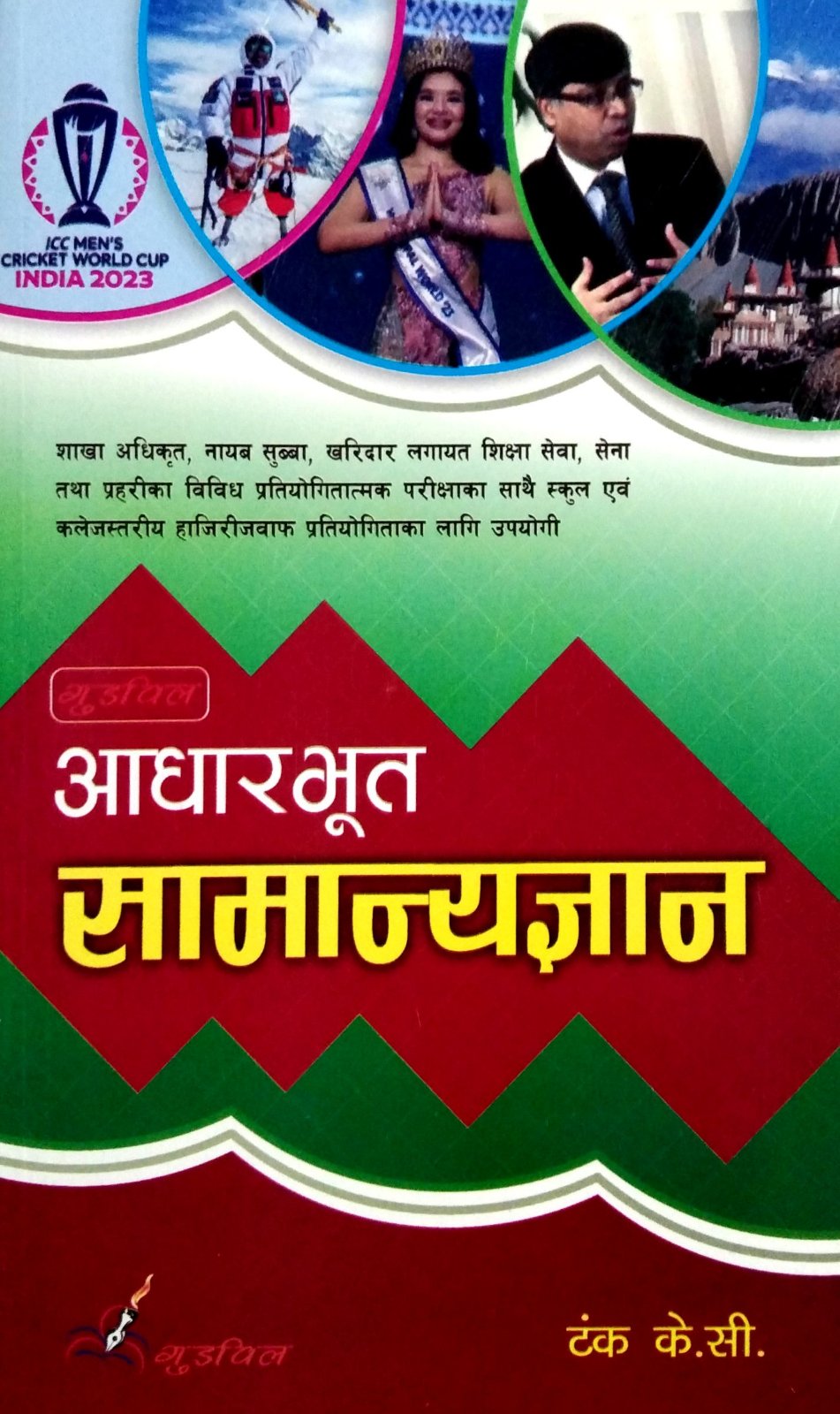
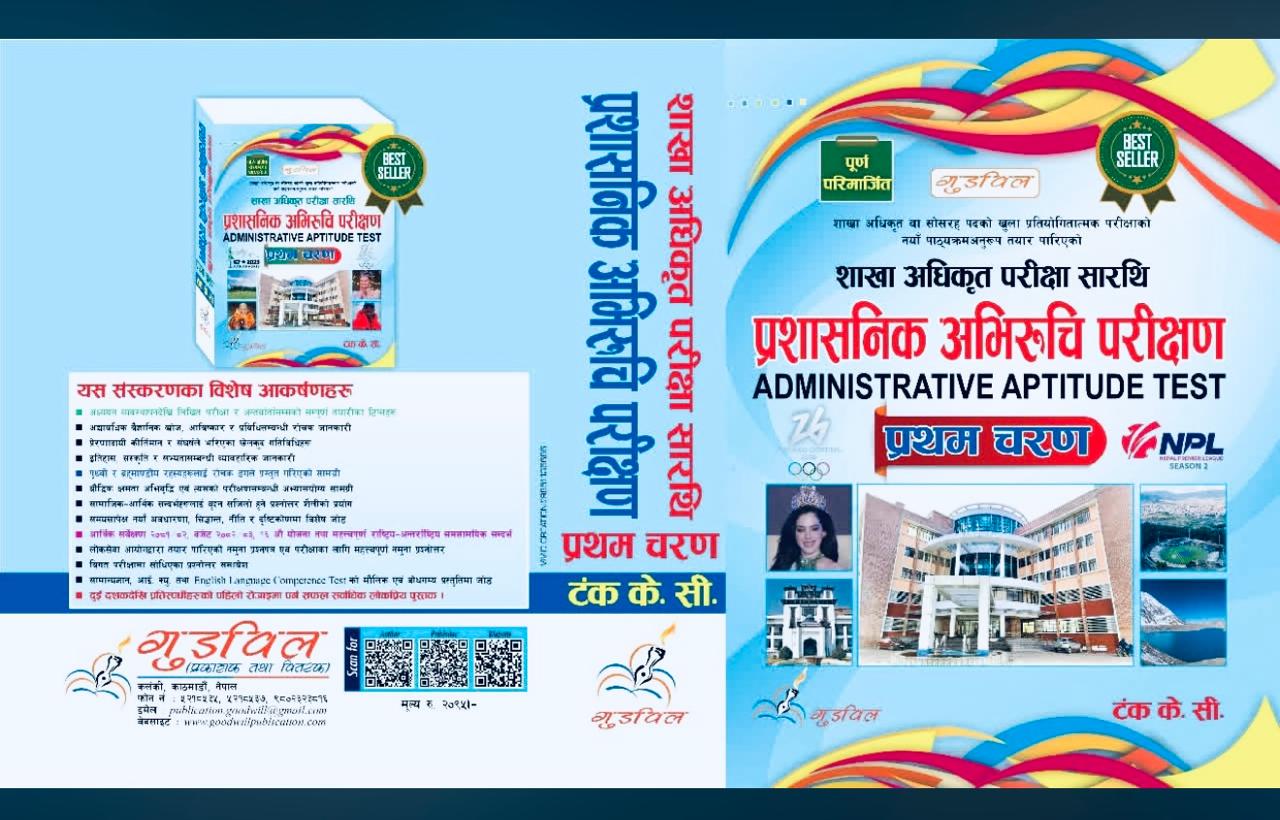
.png)
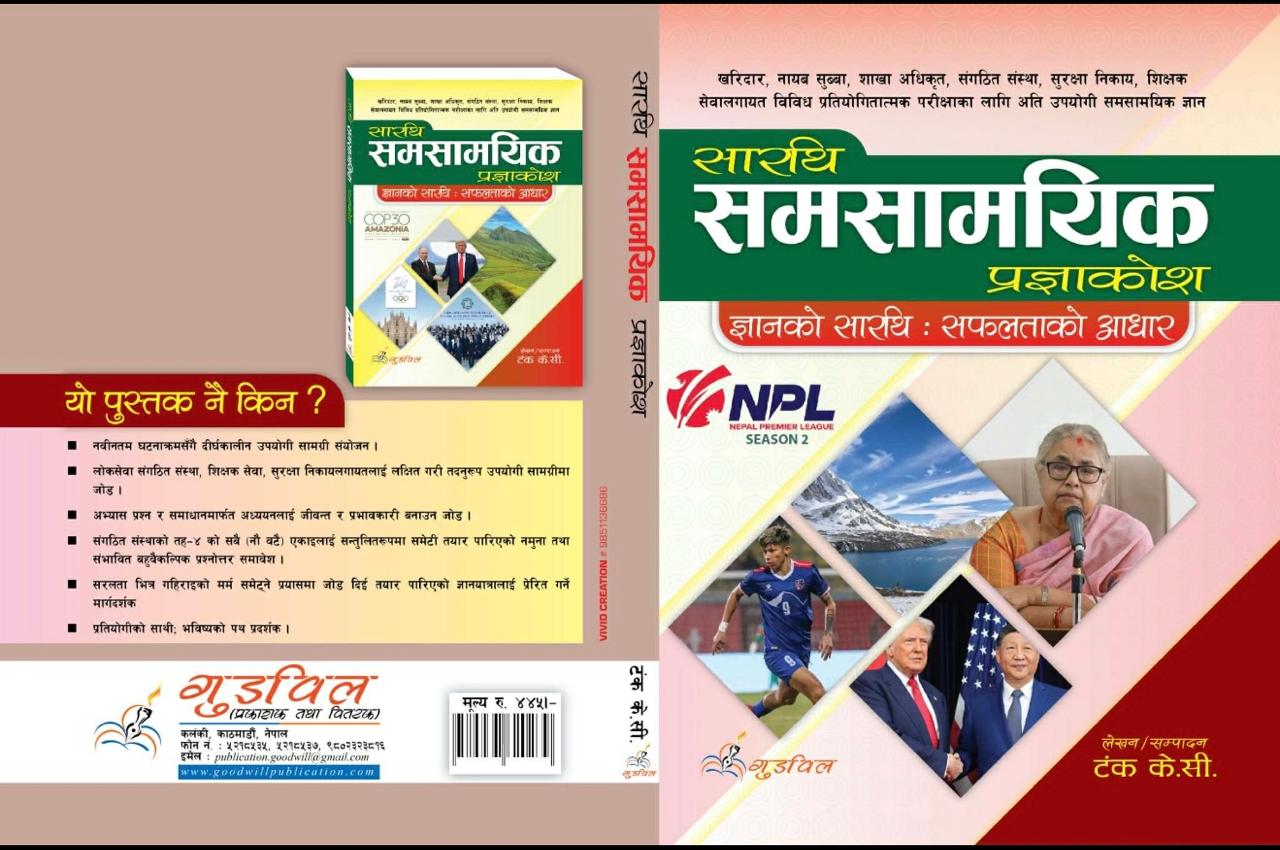
.png)
